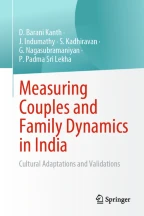Alabama Parenting Questionnaire

Several studies have shown that positive parenting practices favorably influence a child’s personality. In contrast, negative parenting is associated with psychopathological conditions, aggressive behavior, poor school performance, and poor social skills among children. Alabama parenting questionnaire (APQ: Shelton et al., J Clin Child Psychol 25:317–329, 1996) is a 42-item scale to assess parents’ parenting practices with school-age children (5–18 years). The scale consists of five subscales: involvement, positive parenting, poor monitoring/supervision, inconsistent discipline, and corporal punishment. In the present study, we tested the psychometric properties of the Tamil version of the APQ (APQ-T) in the Indian cultural context using a sample of 680 married parents. The CFA showed that a 29-item, 5-factor solution fits the data well (χ2 (361) = 1164.26; CFI = 0.899; RMSEA = 0.057; SRMR = 0.058). The measurement invariance analysis indicated that the APQ-T demonstrated dyadic invariance for factor structure and loading. In addition, the APQ-T showed a moderate correlation between dyadic adjustment and dyadic coping, indicating convergent validity. In the present study, the alpha coefficient was 0.89 for husbands and 0.90 for wives. We conclude that the APQ-T is good for use in the Indian cultural context.
This is a preview of subscription content, log in via an institution to check access.
Access this chapter
Subscribe and save
Springer+ Basic
€32.70 /Month
- Get 10 units per month
- Download Article/Chapter or eBook
- 1 Unit = 1 Article or 1 Chapter
- Cancel anytime
Buy Now
Price includes VAT (France)
eBook EUR 128.39 Price includes VAT (France)
Hardcover Book EUR 147.69 Price includes VAT (France)
Tax calculation will be finalised at checkout
Purchases are for personal use only
References
- Baumrind, D. (1966). Effects of authoritative parental control on child behavior. Child development, 887–907.https://doi.org/10.2307/1126611
- Darling, N., & Steinberg, L. (1993). Parenting style as context: An integrative model. Psychological Bulletin,113(3), 487. https://doi.org/10.1037/0033-2909.113.3.487ArticleGoogle Scholar
- Essau, C. A., Sasagawa, S., & Frick, P. J. (2006). Psychometric properties of the Alabama parenting questionnaire. Journal of Child and Family Studies,15(5), 595–614. https://doi.org/10.1007/s10826-006-9036-yArticleGoogle Scholar
- Frick, P. J. (1991). The Alabama parenting questionnaire. University of Alabama. https://doi.org/10.1037/t58031-000BookGoogle Scholar
- Locke, L. M., & Prinz, R. J. (2002). Measurement of parental discipline and nurturance. Clinical Psychology Review,22(6), 895–929. https://doi.org/10.1016/S0272-7358(02)00133-2ArticlePubMedGoogle Scholar
- Seabridge, S. D. (2014). Examining the link between parenting and child problem behaviors in American Indian families. Doctoral dissertation, Oklahoma State University. Google Scholar
- Shelton, K. K., Frick, P. J., & Wootton, J. (1996). Assessment of parenting practices in families of elementary school-age children. Journal of Clinical Child Psychology,25(3), 317–329. https://doi.org/10.1207/s15374424jccp2503_8ArticleGoogle Scholar
Author information
- Department of Applied Psychology, Pondicherry University, Kalapet, Pondicherry, India D. Barani Kanth
- Department of Applied Psychology, Rajiv Gandhi National Institute of Youth Development, Sriperumbudur, Tamil Nadu, India J. Indumathy
- Department of Psychology, Periyar University, Salem, Tamil Nadu, India S. Kadhiravan
- Department of Humanities and Social Sciences, National Institute of Technology Tiruchirappalli, Tiruchirappalli, Tamil Nadu, India G. Nagasubramaniyan
- Department of Psychology, Reva University, Bengaluru, Karnataka, India P. Padma Sri Lekha
- D. Barani Kanth

